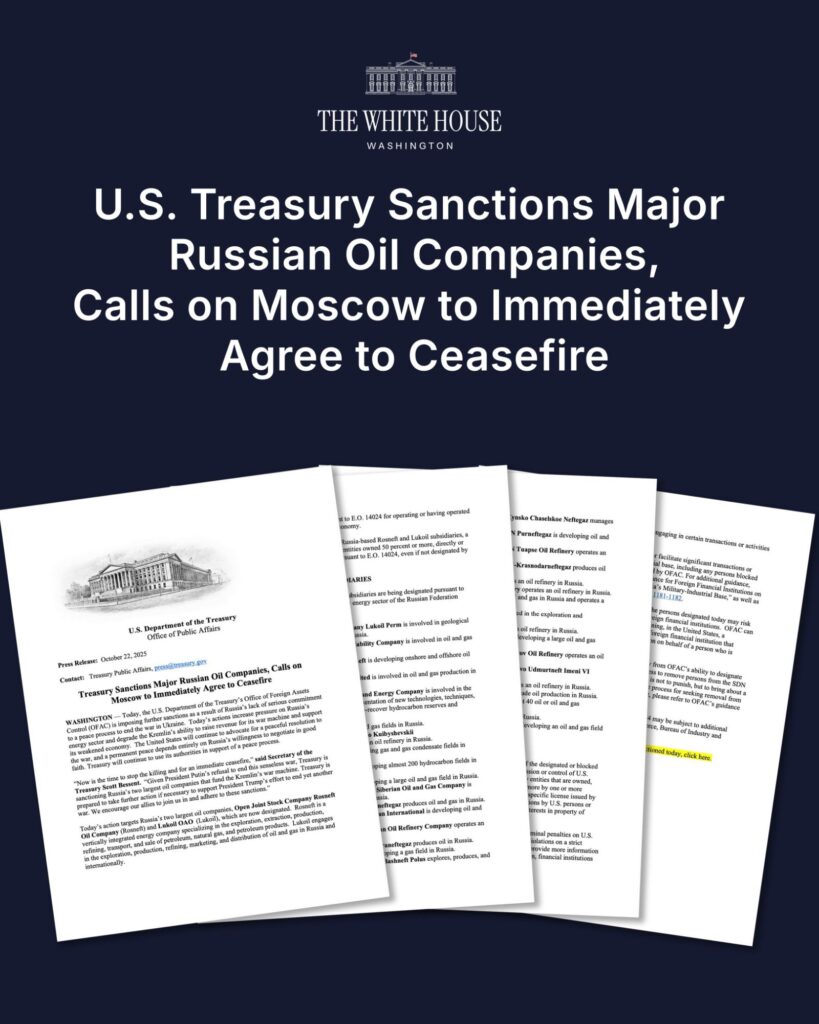WASHINGTON, D.C. Oct 22, 2025 -In a bold escalation of economic pressure amid the ongoing war in Ukraine, the U.S. Department of the Treasury has slapped sanctions on two of Russia’s largest oil companies—Rosneft and Lukoil—targeting their operations and subsidiaries to cripple the Kremlin’s war funding. The move, announced Thursday, comes with a stark call for Moscow to agree to an immediate ceasefire, underscoring the Trump administration’s—renewed push for peace through deterrence.
The sanctions, issued by the Treasury’s Office of Foreign Assets Control (OFAC), designate Rosneft Oil Company and Lukoil as blocked entities under Executive Order 14024 for their roles in Russia’s energy sector, which has been a lifeline for the Kremlin’s military expenditures. Rosneft, a vertically integrated behemoth involved in everything from exploration to refining and sales of petroleum and natural gas, and Lukoil, a global player in oil and gas production, marketing, and distribution, now face frozen U.S. assets and a ban on American transactions.
“Now is the time to stop the killing and for an immediate ceasefire,” declared Treasury Secretary Scott Bessent in the official statement. “Given President Putin’s refusal to end this senseless war, Treasury is sanctioning Russia’s two largest oil companies that fund the Kremlin’s war machine. Treasury is prepared to take further action if necessary to support President Trump’s effort to end yet another war. We encourage our allies to join us in and adhere to these sanctions.”
The action extends to over two dozen Russia-based subsidiaries of both firms, including key players like Lukoil’s Perm and West Siberia units for exploration and production, and Rosneft’s refineries such as the Kuibyshevskiy Neftepererabatyvayushchii Zavod and Tuapse Oil Refinery. Under the designations, any entity owned 50% or more by these blocked companies is automatically restricted, amplifying the ripple effects across Russia’s energy infrastructure.
This latest salvo builds on years of U.S. efforts to squeeze Russia’s fossil fuel exports, which have generated billions to sustain the invasion of Ukraine launched in February 2022. Oil revenues have plummeted for Moscow due to prior caps and bans, but officials say these integrated giants have evaded full isolation through shadowy networks. The Treasury emphasized that the sanctions aim to “degrade the Kremlin’s ability to raise revenue for its war machine and support its weakened economy,” while reiterating U.S. support for a “peaceful resolution” contingent on Russia’s good-faith negotiations.
The White House amplified the announcement on X (formerly Twitter), posting a graphic-laden thread that highlighted the Treasury’s press release and framed the measures as a direct response to Russia’s “lack of serious commitment to a peace process.” Early reactions on the platform were polarized: Supporters hailed it as a “miracle” step toward ending the conflict, while critics decried it as “virtue signaling” or misplaced aggression, with one user quipping, “Russia isn’t an enemy. Israel is. This government is ass backwards!”
Foreign financial institutions face heightened risks for dealings with these entities, including potential secondary sanctions that could bar access to U.S. markets. The Treasury updated its advisory for banks, warning of exposure to Russia’s military-industrial base, and noted that violations could trigger civil or criminal penalties on a strict liability basis.
Analysts predict immediate market tremors: Rosneft and Lukoil shares, already battered, could see further dips on global exchanges, while Brent crude prices—hovering around $75 per barrel—might tick up on supply concerns. European allies, who rely on Russian energy reroutes via India and China, are being urged to align, though enforcement has historically varied.
As the third anniversary of Russia’s full-scale invasion approaches, these sanctions signal no letup in Washington’s hybrid strategy of diplomacy and economic warfare. “A permanent peace depends entirely on Russia’s willingness to negotiate in good faith,” the Treasury stated, leaving the ball firmly in Moscow’s court. Whether Putin blinks remains the trillion-ruble question.

